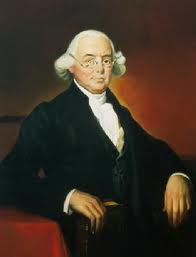 James Wilson was nominated by George Washington to serve as an Associate Justice on the First United States Supreme Court, and was confirmed by the Senate on September 26,1789. Like John Rutledge, he had asked President Washington to be appointed Chief Justice, but Washington instead named John Jay to lead the Court.
James Wilson was nominated by George Washington to serve as an Associate Justice on the First United States Supreme Court, and was confirmed by the Senate on September 26,1789. Like John Rutledge, he had asked President Washington to be appointed Chief Justice, but Washington instead named John Jay to lead the Court.
Born near Saint Andrews, Scotland, in 1742, Wilson moved to Pennsylvania in 1765. After studying law at the office of John Dickinson he was admitted to the Philadelphia bar.
Wilson went on to become a prominent, wealthy member of the bar. He served as a delegate to the Continental Congress from Pennsylvania, and was a signer of the Declaration of Independence.
He later served as a delegate to the Constitutional Convention. He had a great influence upon the convention, and is considered by many as the forgotten founding father. He generally embraced the Federalist ideal of a strong central government, but is not well-remembered today. Stephen A. Conrad wrote an article in 1989 seeking to explain why. Conrad believes that it may be because “Wilson held the common law not only over and above statutory law, but also perhaps–and Wilson’s apparent ambiguity is at the heart of the matter–over and above what we now call constitutional law.” His legacy is also surely not enhanced by Wilson’s dubious distinction of having proposed the “Three Fifths Compromise.”
While a Supreme Court Justice, Wilson was appointed Pennsylvania’s first law professor at the College of Philadelphia (now the University of Pennsylvania). He was commissioned by the college in September of 1790 to give a series of law lectures. This is another example of how differently the Supreme Court was viewed during its early years. A modern justice could never hold a law professorship while sitting on the nation’s highest court. These lectures, only one of which was published in his lifetime, were collected, edited, and published by his son after Wilson’s death. Mark David Hall has written an informative essay on these lectures. The Dickinson College Web Site contains the entire text of the volume originally published by Wilson’s son in 1804.
During his time on the Court, only nine cases were heard. His most notable opinion was delivered in Chisholm v. Georgia (1793). He asserted for the first time the Federal Judiciary’s power to enforce contracts between individual states and citizens of other states. I have previously posted about the fallout caused by this controversial decision. Overall, his career on the Supreme Court was not successful. Wilson became involved in land speculations, and was incarcerated in debtor’s prisons in New Jersey and North Carolina while on the bench. Calls were made for his impeachment. The pressure took its toll. His reputation was destroyed. He was viewed as greedy and unscrupulous. He complained of mental fatigue, and his health began to fail. He died of a stroke in 1798 while visiting his friend Supreme Court Justice James Iredell in North Carolina. He was 56 years old. Impeachment proceedings were still pending at the time of his death.



